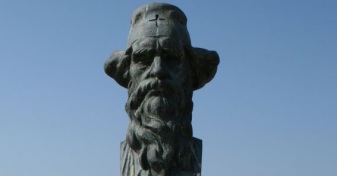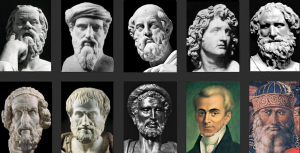
Revolutionary (1541 – 1611)
Many believe that the Greek War of Independence marked the Greeks’ first attempt to overthrow the Turks and regain their freedom. This is far from the truth. Numerous revolutions took place before its onset. Two of the most important ones were organized by Dionysios of Triki, otherwise known as the Philosopher.
Dionysios was a metropolitan bishop and revolutionary, who in 1600 sparked a revolution against the Ottoman Turks in an attempt to liberate Greece and the whole Byzantine Empire. His attempt failed and Dionysios was captured and killed by the Turks. He was nicknamed the Philosopher for his eumathy and his great knowledge.
He was born in Greece. He studied philosophy, mathematics, medicine, logic, astronomy and poetry in the University of Padua. During his time in Europe, Dionysios came into contact with the Western hegemones, seeking help to fulfill his life-long dream: the freedom of Greece and the revival of the Byzantine Empire.
Upon his return to Greece, Dionysios was appointed Metropolitan bishop of Trikala. He quickly began organizing a revolution and funded it in secret. With the help of harmatoles and klephts he had mobilized, Dionysios started the first of his two revolutions only to result in a disastrous outcome, forcing him to flee to Italy and later to Spain and have his rank removed by the Church.
Nevertheless, Dionysios was not disheartened by the revolution’s failure, let alone discouraged; he quickly regained his strength and contacted the French duke Never as well as King Philip III of Spain, prompting them to incite a revolution against the Turks. Following numerous efforts, Dionysios managed to organize a united attack with the help of Bosnia, Bulgaria, Serbia, Croatia, Montenegro and Venice.
In 1611, Dionysios and his army of 800 men reached Ioannina and started the second revolution. Unfortunately, the outcome was grim; after fleeing to a near-by cave he was captured and skinned alive by the Turks. Following hours of inhumane torments and public humiliation, Dionysios was executed.
Dionysios’ reception has been mixed. Some have accused him of provoking two needless revolutions which caused more damage than was necessary, while others hail him as a tireless hero who risked everything for the rebirth of the once powerful Byzantine Empire. What is certain is that Dionysios the Philosopher was a patriot who placed the value of freedom above his own life. He has been recognized as a Saint by the Orthodox Church and today he belongs to the pantheon of Greek heroes.
Bibliography:
- “Dionysios Trikis”. Helios New Encyclopaedic Dictionary. Passas, I. Athens: 1946. Print.
- Ἅγιος Διονύσιος ο Φιλόσοφος. Ορθόδοξος συναξαριστής. www.saint.gr/. Web.
- Ἅγιος Διονύσιος ὁ Φιλόσοφος. Ὁ φλογερὸς Δεσπότης ποὺ ξεσήκωσε τὴν Θεσσαλία καὶ τὴν Ἤπειρο καὶ τὸ μαρτυρικό τέλος του. 10 Ὀκτωβρίου. Χώρα του Αχωρήτου. Choratouaxoritou.gr. Web.
